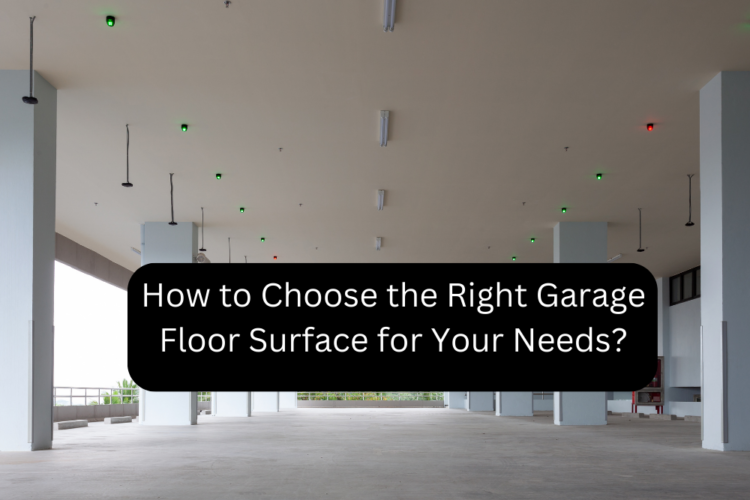The garage, often overlooked in home improvement projects, plays a crucial role in our daily lives. Whether it’s a storage space, a DIY workshop, or a secure parking area, the garage deserves attention, starting from the ground up. Selecting the right garage floor surface is not just about aesthetics; it’s a decision that impacts durability, maintenance, and overall functionality. In this guide, we’ll explore various garage floor surface options and the key factors to consider when making this important decision.
When choosing the right garage floor surface for your needs, consider the following factors:
- Budget: Different materials have varying costs, and your budget will play a significant role in your decision.
- Durability: Evaluate how well the flooring option can withstand the type of traffic and activities that occur in your garage.
- Maintenance: Consider how much time and effort you’re willing to invest in maintaining the floor. Some options require regular cleaning and resealing.
- Aesthetics: Choose a surface that complements the overall look of your garage and meets your aesthetic preferences.
- Installation: Some options are DIY-friendly, while others may require professional installation for renovating your home garage floors. Consider your skill level and the time you’re willing to invest.
- Climate: Consider the climate in your area. Some materials may be better suited for extreme temperatures or high humidity.
Budget Considerations
Your budget is a crucial factor in choosing the right garage floor surface. Concrete is generally the most budget-friendly option, while epoxy coatings and rubber flooring tend to be on the higher end. Interlocking tiles fall somewhere in between, with costs varying based on the material and brand.
Climate and Environmental Factors
Consider the climate in your region and how it might impact your garage floor. If you live in an area with extreme temperatures or high humidity, certain flooring materials may be more suitable than others. Additionally, think about environmental factors like the risk of flooding or exposure to harsh chemicals, as these can influence your choice of garage flooring.
Read: Transitioning Your Wardrobe from Summer to Fall: A Mini Guide
What are the Garage Floor Surface Options?
There are several types of garage floor surfaces available, each with its own pros and cons. Here are some of the most popular options:
Concrete Flooring: The Classic Choice
Concrete is the most common garage flooring material, known for its durability and versatility. While it might seem plain, there are several ways to enhance its functionality and appearance. You can opt for a plain concrete surface, or choose from various decorative options such as staining, polishing, or even adding texture for better traction.
Pros:
- Durable and long-lasting.
- Resistant to most chemicals.
- Budget-friendly.
Cons:
- Prone to cracking over time.
- May stain if not sealed properly.
- Can be hard on the feet.
Epoxy Coatings: Aesthetic and Protective
Epoxy coatings provide a glossy, seamless finish to the garage floor. These coatings are made by mixing a resin with a hardening agent, resulting in a tough, resilient surface. Epoxy is available in various colors and styles, allowing you to customize your garage floor to match your preferences.
Pros:
- Highly durable and resistant to chemicals.
- Easy to clean and maintain.
- Enhances the overall aesthetics of the garage.
Cons:
- Application can be tricky and may require professional help.
- Prone to chipping and peeling if not applied correctly.
Rubber Flooring: Comfort and Safety
Rubber flooring is an excellent choice for those who spend extended periods in the garage. It provides a comfortable surface to stand on, making it ideal for workshops or areas where you’ll be on your feet for extended periods. Additionally, rubber flooring offers excellent traction, reducing the risk of slips and falls.
Pros:
- Comfortable and easy on the feet.
- Provides insulation against cold and damp.
- Slip-resistant.
Cons:
- Not as durable as concrete or epoxy.
- Can be susceptible to damage from heavy equipment or sharp objects.
Interlocking Tiles: Easy Installation and Customization
Interlocking tiles are a versatile and DIY-friendly option for garage flooring. These tiles come in various materials, including PVC, polypropylene, and rubber, allowing you to choose based on your specific requirements. The interlocking design makes installation a breeze, and you can easily replace damaged tiles as needed.
Pros:
- Easy to install without professional assistance.
- Provides a comfortable and cushioned surface.
- Many design and color options available.
Cons:
- Some types may not withstand heavy loads.
- Vulnerable to moisture penetration between tiles.
Garage Floor Maintenance
Once you have chosen a garage floor surface, it is important to maintain it properly. This will help to extend the life of your flooring and keep it looking its best.
Here are a few tips for maintaining your garage floor:
- Sweep or vacuum your garage floor regularly to remove dirt and debris.
- Mop your garage floor with a mild detergent and water.
- Avoid using harsh chemicals on your garage floor.
- Seal your garage floor every few years to protect it from stains and scratches.
- Consider hiring a professional to clean your garage floor annually.
Choosing the right garage floor expert is an important decision, but with a little research, you can find the perfect option for your needs. By considering the factors listed above, you can be sure to choose a surface that is durable, stylish, and easy to maintain. Your garage floor is an important part of your home. It should be durable, easy to clean, and stylish. By following the tips in this article, you can choose the right garage floor surface for your needs.

